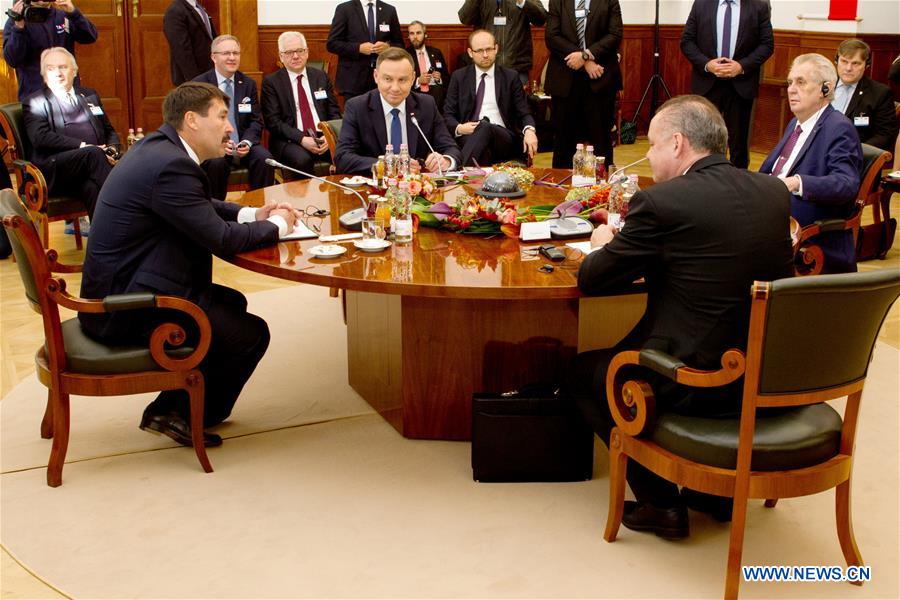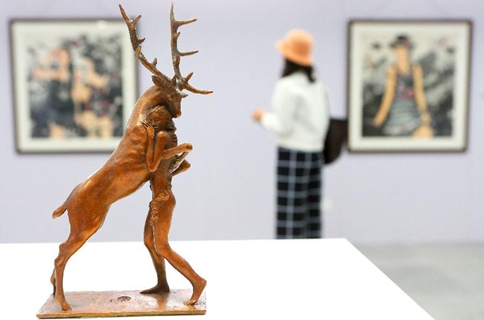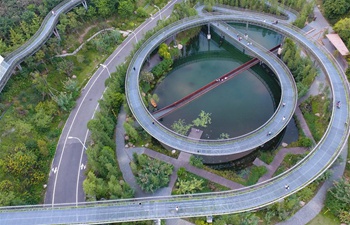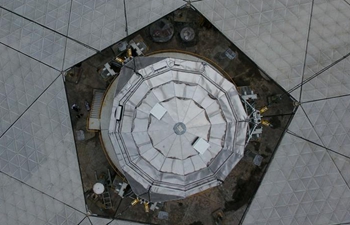Polish President Andrzej Duda (2nd L, front), Czech President Milos Zeman (2nd R, front), Hungarian President Janos Ader (1st L, front) and Slovak President Andrej Kiska (1st R, front) hold a summit meeting in Szekszard, southern Hungary, on Oct. 14, 2017. The European Union (EU) integration of the Western Balkans, the transition to cyclical economy and the digital society were the topics of the two-day summit of the Presidents of the Visegrad countries, namely Poland, Czech Republic, Slovakia and Hungary, Hungarian President Janos Ader said on Saturday at a press conference here. (Xinhua/Szilard Voros)
SZEKSZARD, Hungary, Oct. 14 (Xinhua) -- The European Union (EU) integration of the Western Balkans, the transition to cyclical economy and the digital society were the topics of the two-day summit of the Presidents of the Visegrad countries, namely Poland, Czech Republic, Slovakia and Hungary, Hungarian President Janos Ader told on Saturday at a press conference in Szekszard, southern Hungary.
"I have been to Montenegro earlier this year, and the Montenegrin prime minister told me that the situation is similar to that of the early 90s (a period of war between former Yugoslav states)," Ader warned. "We see territorial, political, ethnical, religious, geopolitical and autonomy-related conflicts, moreover: radical Islam is also present and growing in the region," he added.
Ader said that the only way to resolve these conflicts was the EU integration of the Western Balkans, and deplored that it seemed that this integration was not a top priority for Brussels.
"We need a clear road-map with milestones and deadlines, ambitious negotiations, but also: the candidate countries must show credible performance."
Czech President Milos Zeman underlined that the radical Islam was spreading in the region and that could throw back the integration process. He also urged the integration of the countries of the Western Balkans.
"The situation in the Western Balkans is serious: the youngsters emigrate, the region is full of historical tensions, the economic growth is slow, but they have a common goal: they all wish to become part of the EU," Slovakian President Andrej Kiska explained.
He also added that these countries needed to go through several institutional reforms before joining the EU.
For Polish President Andrzej Duda, the solution to the "calm" in the society of the Western Balkans was the EU integration. "The EU must not become a private club, but an association with open doors that develops and prospers for decades, or even centuries!"
He also underlined that the EU had to be "constructed from the bottom, by the society, and not from the top, by bureaucrats."
The second topic of the discussions was the transition to the so-called cyclical economy, in which the waste produced by the economy becomes an asset and a source of raw materials.
"We can mine gold from stone at a rate of 2 grams per ton, but can get out 300 grams from one ton of electronic waste," Ader declared. He said that the technology existed to change the world. "What is lacking is the political will."
His colleagues agreed and urged the beginning of talks at experts level, and both Zeman and Kiska underlined the importance of education regarding this subject.
Duda made it clear that the topic of the digital transition could not be separated from the cyclical economy. "These two topics are interlaced because economic development is also related to the digital market, hence new pilot programs have to be started," he said, also mentioning the importance of education, which brings increased effectiveness for the economy and the environment.
The last topic covered was that of the digital society. Ader warned that the new digital era had as many threats as it had opportunities. "The digital society opens up many new ways of development, ones that were unthinkable before, but they are also bearing risks, such as the use of the internet by terrorists, who hide thanks to the truly useful online protection of personal data."
Zeman said that the digital era would have a very powerful effect on the industrial production through the development of robotics in production. "One of the effects of the digital society will be the decrease of labor days."
Kiska pointed to the threats posed by the use of the social networks such as Facebook or Twitter by extremists. "Under the effects of fast spreading hoaxes and fake news, close to 30 percent of youngsters in Slovakia would choose extremism, we have to work together with these social network giants to block hate speech and intolerance within their networks," he warned.
He also said that new technologies always brought new opportunities such as Uber or Airbnb, but they also brought new problems and conflicts with traditional firms, who are their competitors. He urged nevertheless for a common EU level policy regarding the regulation of the new era enterprises, instead of having each city come up with each individual set of rules.
Finally, Duda concluded the press conference by drawing the attention to the fact that the Visegrad countries were less developed than Western European countries, but surpassed many of them in digital related areas, such as the access to and the speed of boradband internet connection.


















